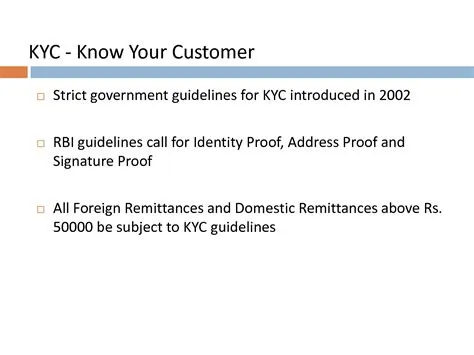Hey there, fellow finance enthusiasts! Ever wondered how micro-investing-trends">micro-investing-tools">micro-investing-strategies">micro-investing-risks">micro-investing-platforms">micro-investing-basics">micro-investing platforms keep our money safe and sound? It’s not magic, folks. Behind the scenes, there’s a whole world of compliance, specifically focusing on KYC (Know Your Customer) and AML (Anti-Money Laundering) regulations. Think of it as the security system for your digital piggy bank. And trust me, these systems are evolving faster than you can say “Bitcoin!” Let’s dive into eight key trends shaping this exciting – and crucial – area.
1. The Rise of AI and Machine Learning in KYC/AML
Remember those tedious forms you fill out when you open a new account? Well, AI is making them smarter (and hopefully quicker!). Machine learning algorithms are now used to verify identities, flag suspicious transactions, and generally make the entire process more efficient. Think of it like having a super-powered detective scrutinizing every transaction for anything out of the ordinary. This helps platforms detect fraud and money laundering attempts more effectively than ever before. It’s not about replacing human oversight; it’s about giving humans the tools to do a better job.
2. Enhanced Due Diligence (EDD) – Going the Extra Mile
Standard KYC checks are a good start, but sometimes you need to dig deeper. Enhanced due diligence means adding extra layers of scrutiny for high-risk customers or transactions. Think of it as a security detail for VIPs in the world of finance. If a transaction seems fishy – maybe a sudden influx of large sums from an unknown source – EDD kicks in to ensure everything’s above board. It’s about mitigating risk, and that’s a good thing for everyone involved.
3. Blockchain Technology: A Game-Changer?
Blockchain, the technology behind cryptocurrencies, is showing potential in enhancing KYC/AML compliance. Its inherent transparency and immutability could make it easier to track transactions and identify suspicious activity. Imagine a digital ledger that’s nearly impossible to tamper with; that’s the power of blockchain. However, it’s early days yet, and integration still faces challenges. But, the future is bright!
4. RegTech Solutions – Streamlining Compliance
RegTech, or regulatory technology, provides software solutions designed to automate and simplify compliance processes. These tools handle everything from identity verification to transaction monitoring, making it easier for micro-investing platforms to meet regulatory requirements. They are basically the modern-day equivalent of a super-efficient filing system for regulatory information.
5. The Importance of Data Privacy
Collecting customer data is essential for KYC/AML, but doing so responsibly is crucial. Privacy regulations like GDPR are tightening the screws, meaning platforms must be transparent and secure in how they handle personal information. It’s a delicate balance: robust security measures are needed, but they also must respect individual rights. Privacy isn’t just a good idea; it’s the law!
6. Cross-Border Collaboration – A Global Effort
Money laundering doesn’t respect national borders. Effective KYC/AML compliance requires international cooperation and information sharing between financial institutions and regulatory bodies. Think of it like a global network fighting a common enemy – financial crime. The more they work together, the better equipped they are to stop illicit activities.
7. The Growing Focus on Beneficial Ownership
Identifying the true owner of an investment is vital in preventing money laundering. Regulations are increasingly emphasizing the need to determine beneficial ownership – who really controls the assets, even if it’s hidden behind layers of shell companies. It’s like peeling back the layers of an onion to get to the heart of the matter. It’s about transparency and accountability.
8. Continuous Monitoring – The Ongoing Battle
KYC/AML compliance isn’t a one-time thing. It’s an ongoing process requiring continuous monitoring of customer activity and transactions. Think of it as a 24/7 security guard, constantly vigilant for any unusual behavior. This includes regularly reviewing customer profiles and implementing enhanced due diligence whenever necessary.
Conclusion
The world of micro-investing is booming, but responsible growth requires robust KYC and AML compliance. These eight trends highlight the innovative solutions and evolving regulations shaping this crucial aspect of the financial landscape. By embracing technology, collaborating internationally, and prioritizing data privacy, the industry can create a safer and more secure environment for all investors. It’s a commitment to integrity and a promise of trust in the digital financial world. As technology advances, the fight against financial crime becomes more sophisticated, which ensures the future of micro-investing is safe and secure.
FAQs
Q1: What happens if a micro-investing platform fails to comply with KYC/AML regulations?
A1: Non-compliance can lead to hefty fines, reputational damage, and even the suspension or closure of the platform. It’s a significant risk that platforms must take seriously.
Q2: How can I as an investor help ensure compliance?
A2: Be diligent in providing accurate information during the account setup process, and report any suspicious activity you may observe. Remember that everyone has a role to play.
Q3: Are these regulations only for large financial institutions?
A3: No, KYC/AML regulations apply to all financial institutions, including micro-investing platforms, regardless of size. The goal is to cover all possible risks and vulnerabilities.
Q4: What role does customer education play in KYC/AML compliance?
A4: Educated investors are better equipped to identify and report suspicious activities, helping platforms and regulators in their efforts. This is a shared responsibility.
Q5: How are these trends likely to evolve in the future?
A5: We can expect even more sophisticated AI and machine learning applications, a greater emphasis on blockchain technology, and tighter international collaboration. The focus will continue to be on enhancing both security and privacy.

